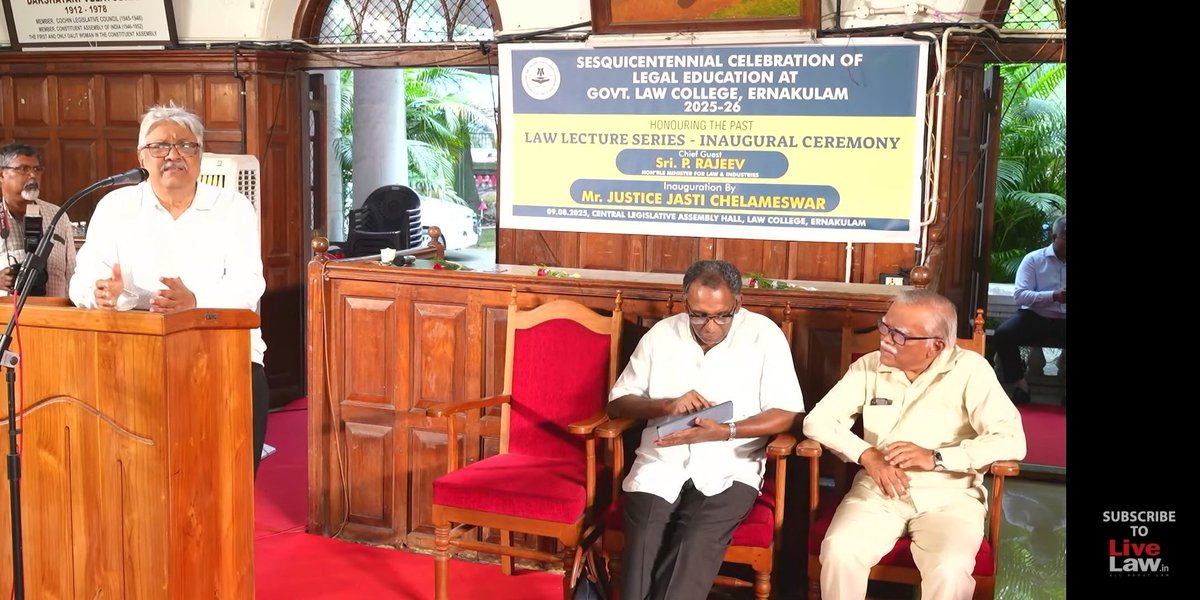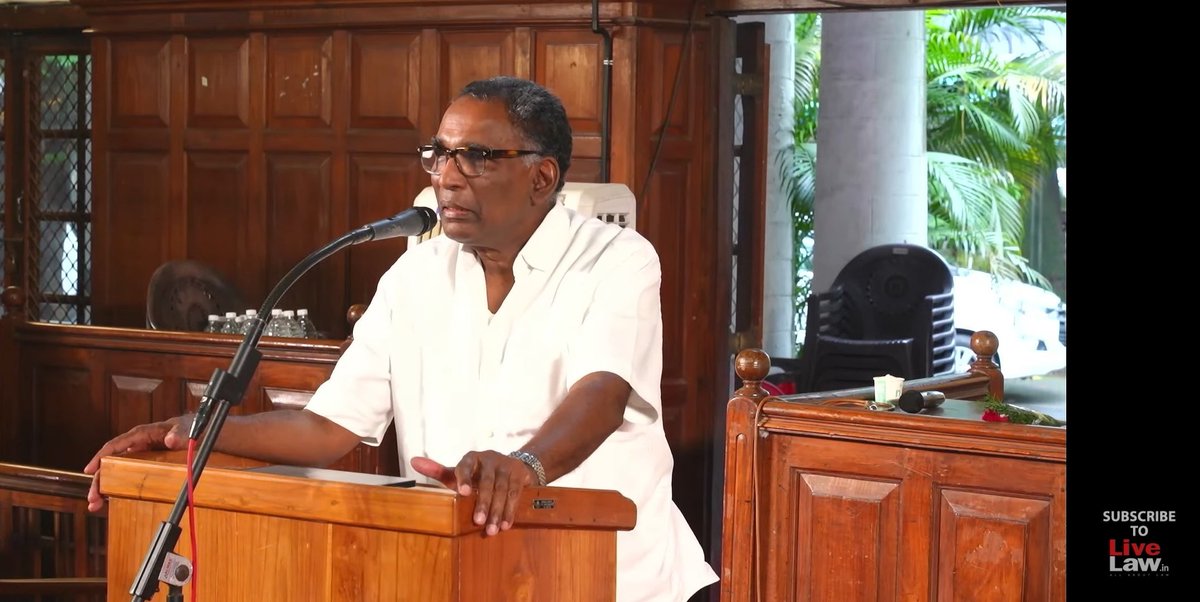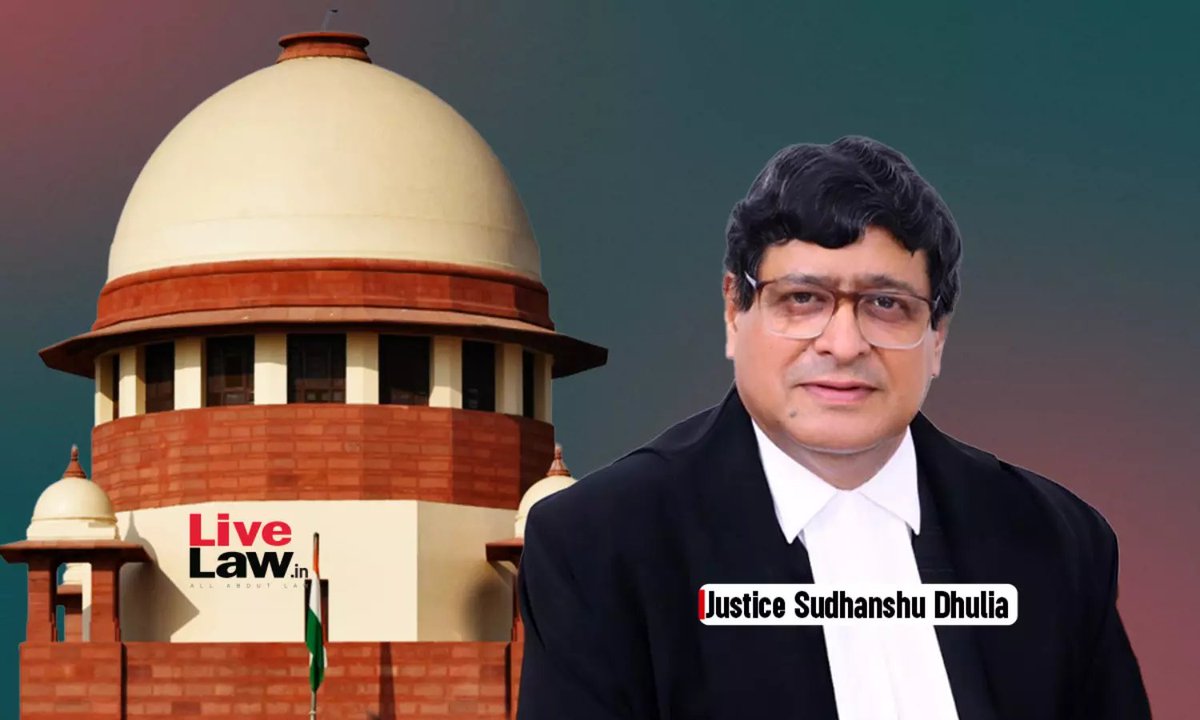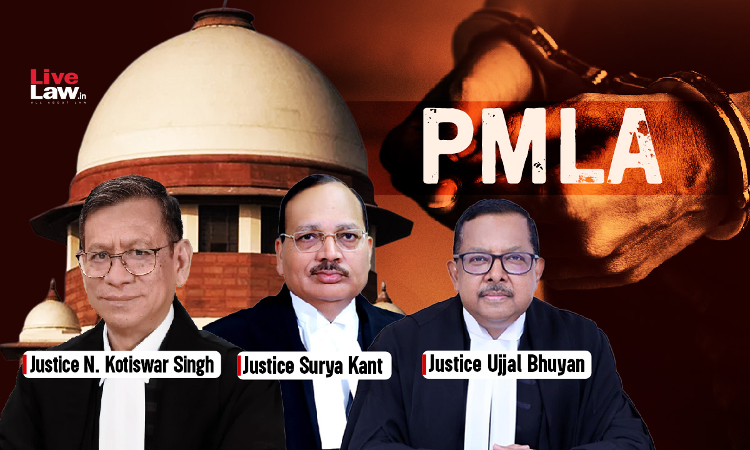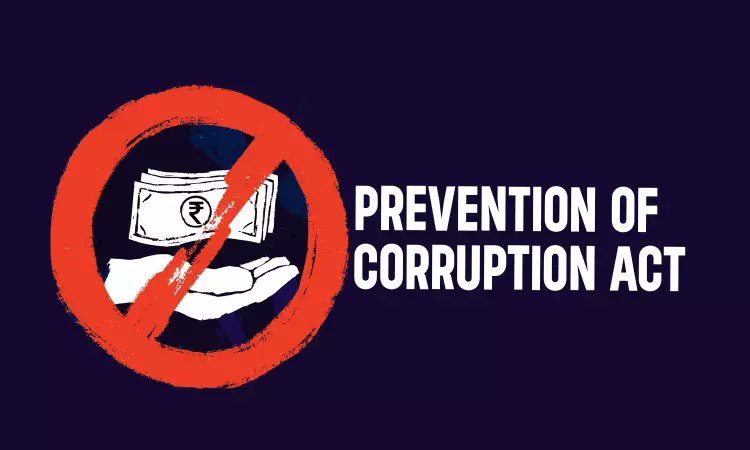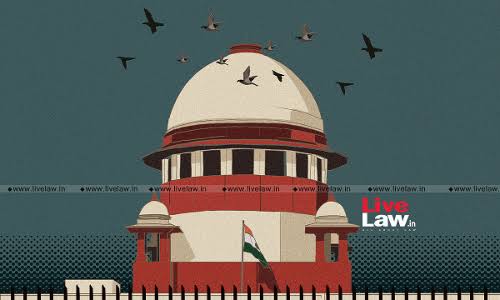Former Supreme Court judge Justice Jasti Chelameshwar to shortly deliver a lecture on "Clamour for Removal of Secularism & Socialism: Whether Justified" at the Government Law College, Ernakulam.
Follow this thread for updates.
Follow this thread for updates.
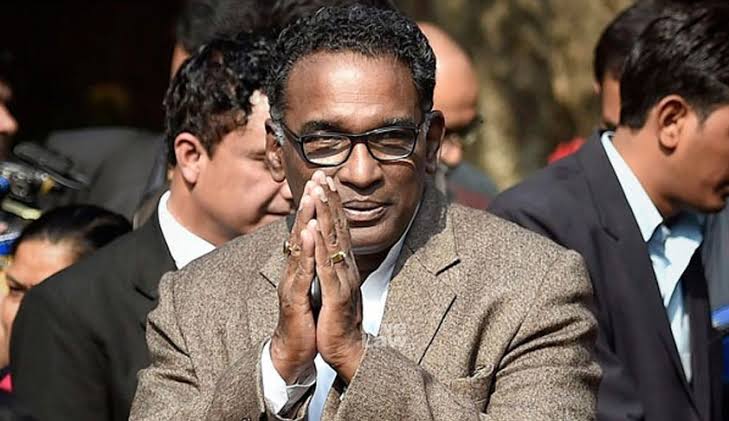
Watch live:
J Joseph: the real problem is politicians make use of religion. Religion per se does not really create any problem. In fact Hindu religion which is practiced by 81 odd percentage of the population is the most tolerant religion, that is accepted in the world.
J Joseph: the problem lies at the doorstep of the politicians for making use of it. Much of the case law under from the Supreme Court under Representation of People Act... where speeches are made by politicians and religion is used for the purpose of gaining power, this is where the problem lies.
J Joseph: my view is that if somebody tries to remove secularism it is intended to create mischief because India is a secular country under the constitution otherwise.
Coming to socialism, there are many definitions. The most commonly understood meaning is state ownership of means of production.
Coming to socialism, there are many definitions. The most commonly understood meaning is state ownership of means of production.
J Joseph: this is the communist, Karl Marx understanding. Ultimate power through revolution to seize the power and to nationalise and own and control means of production for the good of the society. But there are other meanings also attributed to the word.
J Joseph: Part 4 of Indian Constitution that is Directive Principles of State Policy actually enshrines the second generation of human rights. The Supreme Court by creative interpretation has married part 3 (fundamental rights) and part 4 to provide various rights.
J Joseph: today 1% of Indian population on 22% of national income. 1% controls 45% of the wealth of the nation. The inequality has grown despite the injunction under article 38 that the state must strive to minimise inequality
J Joseph: but the direction the Indian economy has taken is to produce 200 billionaires - third largest number in the world. But 3.44 crore Indians are living in extreme poverty, which means they are earning less than two US dollars in a day.
J Joseph: we are witnessing a shift in the economic model that the government wants to achieve. Which is that we want to become the country with the largest absolute GDP, for instance. But what is the per capita distribution? Plus we have the largest population which means we will naturally have a larger GDP
J Joseph: but in actual terms we are far behind other countries. The concept of socialism assumes importance here. Even if you were to delete the term from the constitution as long as we continue to have the chapter on Directive Principles no state or centre can actually wander away from the socialist path, if socialist path is not to be confined to the communist model.
J Joseph: we do not have a communist model because article 19 gives everyone the fundamental right to pursue a vocation. We have a mixed economy. Allowing that the public sector to civil up thinking that they should not have such a huge role is a different thing.
J Joseph: but the fact remains that our economy contemplates the role of both the state and the private sector. What is the proportion and the relation is to be decided by the government of the day. If there is an idea to remove the word socialist it will be at the risk of diluting the goals which were actually and enshrined in part 4 of the Constitution
J Chelameshwar: for 25 - 26 years after the formation of the republic these two words did not exist in the constitution. But even without that parts of the Constitution dealt with these aspects.
J Chelameshwar: Technically speaking, what could be brought in by amendment could be deleted by an amendment there shouldn't be any difficulty. Almost every politician and political party pays a tremendous lip service to Dr. Ambedkar
J Chelameshwar: people claim that he is the one who gave the constitution to this country. His contribution is extraordinary no doubt. But if he created such a wonderful document, why did it require 138 amendments average of two amendments a year?
J Chelameshwar: Either there is something wrong with the idea of Babasaheb or there is something wrong with us we are not able to work the constitution. Whichever is right is up to you to determine. In his last speech in the constituent assembly he said, now that there is a constitution there are legally permissible way for getting remedies and the political anarchy must stop. Unfortunately we didn't listen to him
J Chelameshwar: Second thing he said that don't surrender your liberty in front of a great man, whoever it is.
J Chelameshwar: constitution in any country there is an ongoing debate and there is nothing petrified about the constitution. It requires adaptation for the changing times and changing requirements. What is the requirement to change is the more important question. Do we need to change these two words?
J Chelameshwar: Justice Joseph mentioned that said that US constitution has no reference to these things based on a laissez faire state. The reason is that they have one fifth of Indian population today and the land mass is almost 5 times more than the Indian land mass.
J Chelameshwar: they have man made poverty and there are some billionaires and then some people who are not very affluent. But this kind of object poverty is not possible in US that is in India and many other parts of the world. It was the fact in Russia that led to the revolution.
J Chelameshwar: so the constitution is a continuous process and it is not something that falls from heaven overnight. It comes from experience.
J Chelameshwar: In one of my judgements I said it - don't read the constitution as a document written in paper with ink. Please read it as something written in the blood of Martyrs of Jallianwala Bagh when you will understand what it wants to convey. Otherwise it is like any other enactment or any other law.
J Chelameshwar: what kind of social system did we have before 1950. Was everyone treated equally? No. Even in America they weren't. Till 1960 coloured people in America had separate schools, separate beaches, everything separate. It is the same wherever in the world.
J Chelameshwar: Names change but human nature is the same. People try to assert superiority and that leads to oppression and unwarranted exploitation of fellow human beings. These are all things that were in the mind of the members of the constituent assembly. And they were willing to learn from someone who is more learned than them
J Chelameshwar: various factors of the Karachi resolution were widely deputy debated in the constituent assembly. Secularism in the context of us is different. They don't use the word, but it is separation of Church and state. But India is home to innumerable religious practices and denominations
J Chelameshwar: we only talk about two or three religious denominations unfortunately. There was a phase where Vaishnavites and Shaivites fought blood baths.
J Chelameshwar: there was virtually an Exodus from Tamilnadu. This is not unique to India. People went to America from Europe to escape religious persecution there. Just to guard against these kind of practices, to establish a more civilized humane society, constitutions are prepared.
J Chelameshwar: India was never a single political entity in the history. There was a Maharaja every few kilometres and even that changed within every 20, 30 years. With these many variations for the first time an experiment was undertaken to create a huge single political entity
J Chelameshwar: and immediately before the coming into existence of the republic the experience of division of the subcontinent into two States purely on a religious basis the existence of huge segments of population belonging to various denominations, some arrangement had to be made to assure each one of them both minority and majority that state will not interfere in these matters
J Chelameshwar: what great wisdom got into the minds of the members of the parliament during the 42nd amendment to introduce these two words.... If that huge document could not convince them of the socialist and secular structure adding that to words I don't know what wisdom was that. Anyways they did it
J Chelameshwar: Sloganeering has always been part of politics. Mr Palkhivala used to deliver an annual lecture every year after the budget. He said that socialism can mean many things, for some it means a berth in the Union Cabinet.
J Chelameshwar: this country is full of people of various paths of faith. To provide an environment for all these people to live together peacefully the constitution was created. Even if we drop it (secularism) today the other parts remain, the fundamental rights.
J Chelameshwar: coming to socialism, what they did in 1991 is without deleting the word socialism they deleted everything. I am not blaming them they were alive to the reality of that day. Indian economic situation was such that, the survival of the nation the national indebtedness, unless they deviated from the concept the gold reserves would have to be pledged with the IMF
J Chelameshwar: we hear a lot that Supreme Court was wrong in laying down the basic structure doctrine, the elected parliament should have the authority to amend the constitution. We can change, in theory nobody can disputed. The question is it a majority in the parliament which enables us to destroy...
J Chelameshwar: ultimately members of the parliament members of the legislative assembly judges all of us are members of the civil society. It is there own maturity level that preserves or destroys the constitution. Preserving a word here deleting a word there will not make a difference
J Chelameshwar: we human beings make the nation. It is for us collectively to determine whether we should live in a secular society in a true sense of it. We are willing to look at all human beings as human beings, not by their cultural practices.
J Chelameshwar: And as lawyers of law it is our responsibility to tell the society, to as many people as possible - "look here, would we like to live in a country where you have new freedom of conscience or no freedom of liberty?"
That is the question ultimately. It is for us to determine. Thank you.
That is the question ultimately. It is for us to determine. Thank you.
During Q&A session -
What is happening in this country is that elected representatives believe that we have got the mandate from the people so whatever we do is right. That is exactly the constitutional issue. That is what is not approved by the Constitution.
What is happening in this country is that elected representatives believe that we have got the mandate from the people so whatever we do is right. That is exactly the constitutional issue. That is what is not approved by the Constitution.
J Chelameshwar: we don't want this constitution throw it out throw it in the Arabian Sea that is a different tissue I am not on that. So long as this is the system that we have chosen, the legal system is the umpire between the legislative bodies and the constitutional correctness.
J Chelameshwar : you have to accepted. If you don't like a particular view you have to continue fighting that - please correct your view. It is possible. What was right in Golaknath was overturned in 1973.
On the question whether a new perfect political system can be found for the country:
J Chelameshwar: Nothing can be perfect. In natural sciences some degree of approximation of the truth is possible. But in human sciences the variables are too many. 600 crore people on the face of the Earth today no two human beings think alike
J Chelameshwar: Nothing can be perfect. In natural sciences some degree of approximation of the truth is possible. But in human sciences the variables are too many. 600 crore people on the face of the Earth today no two human beings think alike
J Chelameshwar: but you don't give up. you want to better system what you believe would be a better system you fight for it.
somebody asked me why did I hold the press conference. I said I thought things are not right and I owed a duty to my fellow citizens of this country which gave me the honour of becoming a Supreme Court judge
somebody asked me why did I hold the press conference. I said I thought things are not right and I owed a duty to my fellow citizens of this country which gave me the honour of becoming a Supreme Court judge
J Chelameshwar: A lot of people criticized me for holding the press conference, I am not on that. That is a way I chose. So long as I don't resort to violence I can advocate my views and you can also do it.
@threadreaderapp unroll
• • •
Missing some Tweet in this thread? You can try to
force a refresh

